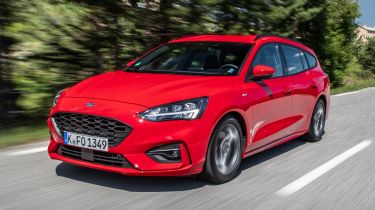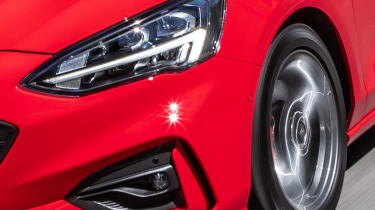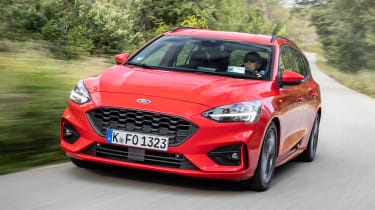New Ford Focus ST-Line Estate 2018 review
Ford Focus ST-Line Estate joins the all-new hatch in the line-up, and it could well be a class leader…

While a run on UK roads proves a tough test for the new Focus Estate, this first drive suggests we may have a new class-leader on our hands. Attractive, spacious, comfortable and well-built, the Focus Estate already ticks the most important boxes – but it also offers the fun factor none of its rivals can quite match.
The conventional Focus hatchback is only part of Ford’s family car success story. The practical estate versions have also contributed to the two million Focus models sold in the UK since 1998.
Alongside the latest hatch, Ford is also launching an all-new Focus Estate. It costs £1,080 more than the equivalent five-door, is 290mm longer and a touch taller, too. Its wheelbase is identical, however, and front cabin passengers won’t notice any increase in interior volume – other than the rear window being slightly further from the rear-view mirror.
• All-new Ford Focus 2018 review
Rear-seat passengers will notice the difference, though, with a little extra headroom. The real benefit is in luggage volume: the Focus Estate offers 608 litres with the rear seats in place, compared to 375 litres for the hatchback. With the seats folded there’s a similar improvement, with 1,653 litres of storage. Those figures are significantly greater than the old Focus wagon, and they’re bigger than those of the Volkswagen Golf Estate, too. You’ll still be able to pack more kit into a Skoda Octavia Estate, however.
Ford has managed to squeeze that volume into the car without resorting to boxy styling. The latest Focus isn’t quite perfect, but it’s more attractive than the car it replaces. The Estate is probably the pick of the current range in styling terms, too, particularly with the neat alloy wheels, rear spoiler and bodykit of ST-Line models.
Used - available now

2020 Ford
Focus
38,091 milesManualDiesel1.5L
Cash £13,687
2022 Ford
Focus
45,977 milesManualPetrol1.0L
Cash £11,887
2020 Ford
Focus
77,446 milesManualDiesel1.5L
Cash £8,763
2020 Ford
Focus
48,016 milesManualPetrol1.0L
Cash £11,400It’s a similar story inside, where the new car takes a big step over its predecessor. The dashboard layout is intuitive and the new central touchscreen a big improvement over the slow, unresponsive screen in the old car. There’s good adjustment in the seats and steering wheel too, and while you’ll still find some scratchy plastics lower down, the Focus has definitely moved a few paces closer to cars like the Volkswagen Golf or Audi A3.
And dynamically, it’s right at the top of its class, too. You’d be hard-pressed to know you were driving an estate when you first thread the Focus down a twisty stretch of road - even driven back-to-back with the hatch you lose very little in terms of agility, grip or fun.
Estate models use a slightly revised suspension setup to their hatchback counterparts, but the end result is effectively the same. You’ll notice the identically precise, well-weighted steering, as well as the balanced and adjustable behaviour. In fact, no rival can match the Focus Estate for driver fun.
• New Ford Focus diesel 2018 review
It rides well, too. The ST-Line is 10mm lower than other Focus models and is slightly firmer, as well – yet it brilliantly toes the line between compliance and tautness. It rarely feels troubled by rougher surfaces, and manages to resist roll in corners.
Ford’s 1.5-litre three-cylinder EcoBoost engine is as good here as it is in the lighter Fiesta ST, despite having less power. Responses are dulled below 2,000rpm, but past this point it pulls quickly and smoothly to its 6,000rpm power peak. At town speeds and on the motorway it’s as quiet as you’d want - and there’s relatively little wind or tyre noise either.
There’s load of different trims to choose from; the Focus Estate is also available as a luxurious Vignale variant, and will eventually be sold in rufty-tufty Active form. Throw in a wealth of equipment and safety technology, and it looks like the current class-leading Skoda Octavia Estate has a real fight on its hands.










